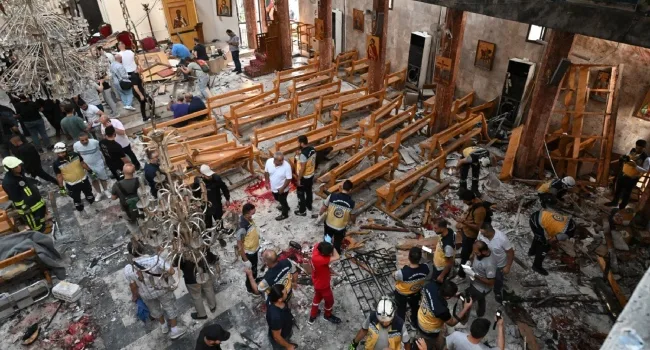A shooting and suicide bombing at a packed church in Damascus on Sunday left at least 22 people dead and 63 injured, marking the first such attack in the Syrian capital since the fall of former president Bashar al-Assad in December.
According to Syria’s interior ministry, the attacker—identified as a member of the Islamic State (IS) group—opened fire inside Saint Elias Orthodox Church in the Dwelaa district before detonating an explosive belt. It is the first confirmed suicide attack targeting a church in Syria since the civil war began in 2011.
Eyewitnesses described scenes of horror as the blast ripped through the congregation during a service. “People tried to stop him before he blew himself up,” said one survivor, Lawrence Maamari. Another witness, Ziad Helou, described hearing gunfire and an explosion, followed by shattered glass and flames.
AFP correspondents reported scenes of devastation inside the church—splintered pews, bloodstains, and icons lying shattered on the floor. First responders were seen evacuating the wounded as security forces cordoned off the area.
The attack triggered widespread condemnation. The Orthodox patriarchate in Damascus demanded full accountability, while UN Syria envoy Geir Pedersen called it a “heinous crime” and urged a thorough investigation.
International reactions poured in. The U.S. expressed solidarity with Syria against “forces sowing instability,” while Turkey emphasized unity against terrorism. France reiterated its support for a peaceful, pluralistic Syria, and Egypt’s Al-Azhar described the bombing as a “blatant assault on the right to life and worship.”
Interior Minister Anas Khattab said investigations were underway and vowed that such attacks would not derail Syria’s path to civil peace. He added that IS had recently shifted its strategy to “target strategic and sectarian sites,” noting previous attempts to attack Christian and Shiite communities had been thwarted.
The Islamic State, which once held vast territory in Syria and Iraq, was territorially defeated in 2019 but continues to mount sporadic attacks. Just last month, IS claimed responsibility for its first attack on Syria’s new government forces.
The country’s Christian population has plummeted from around one million before the war to fewer than 300,000, largely due to displacement and emigration.


